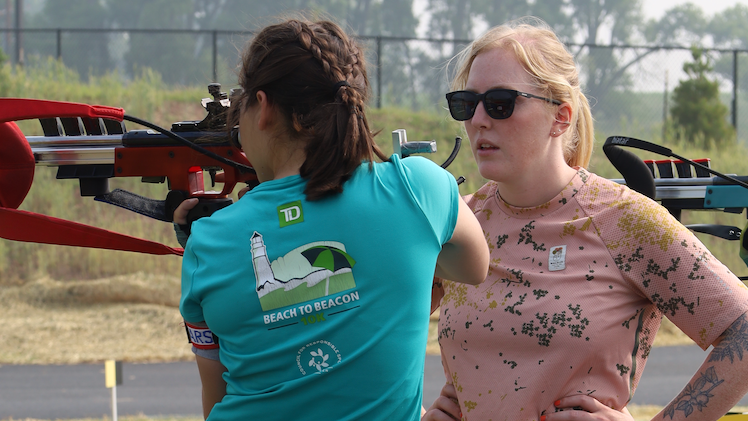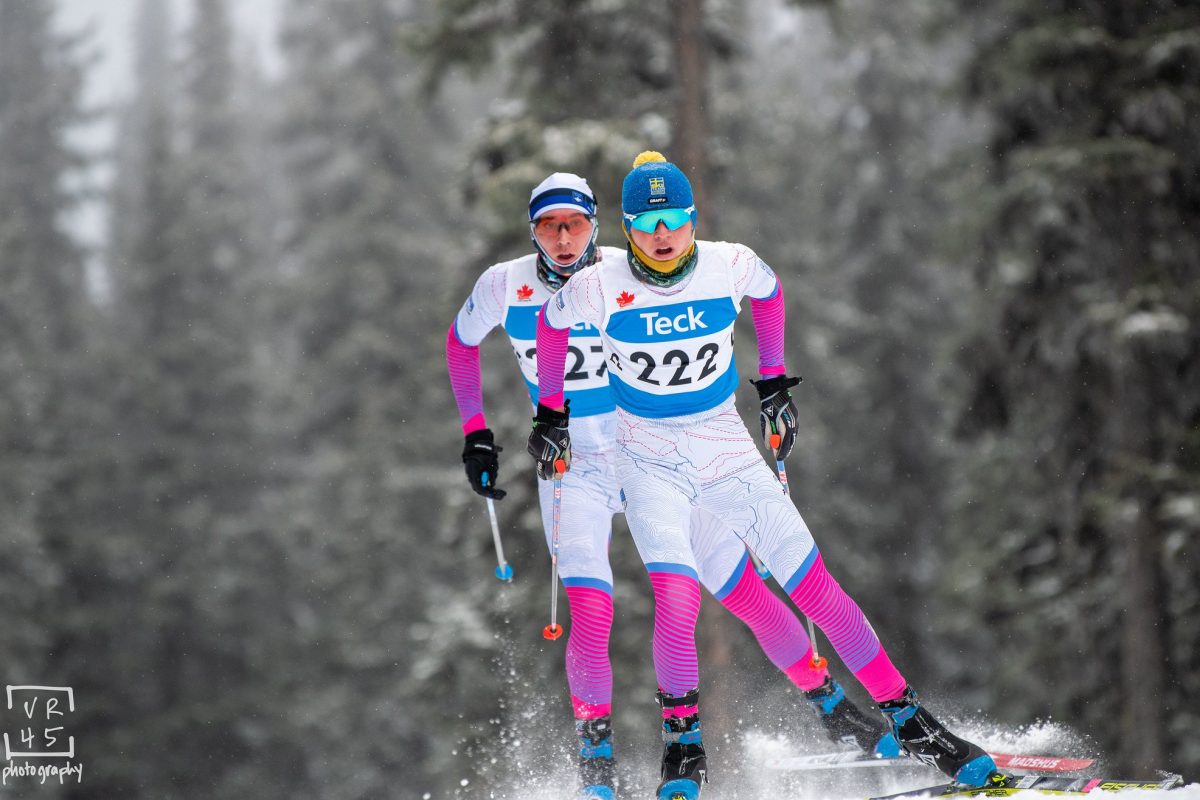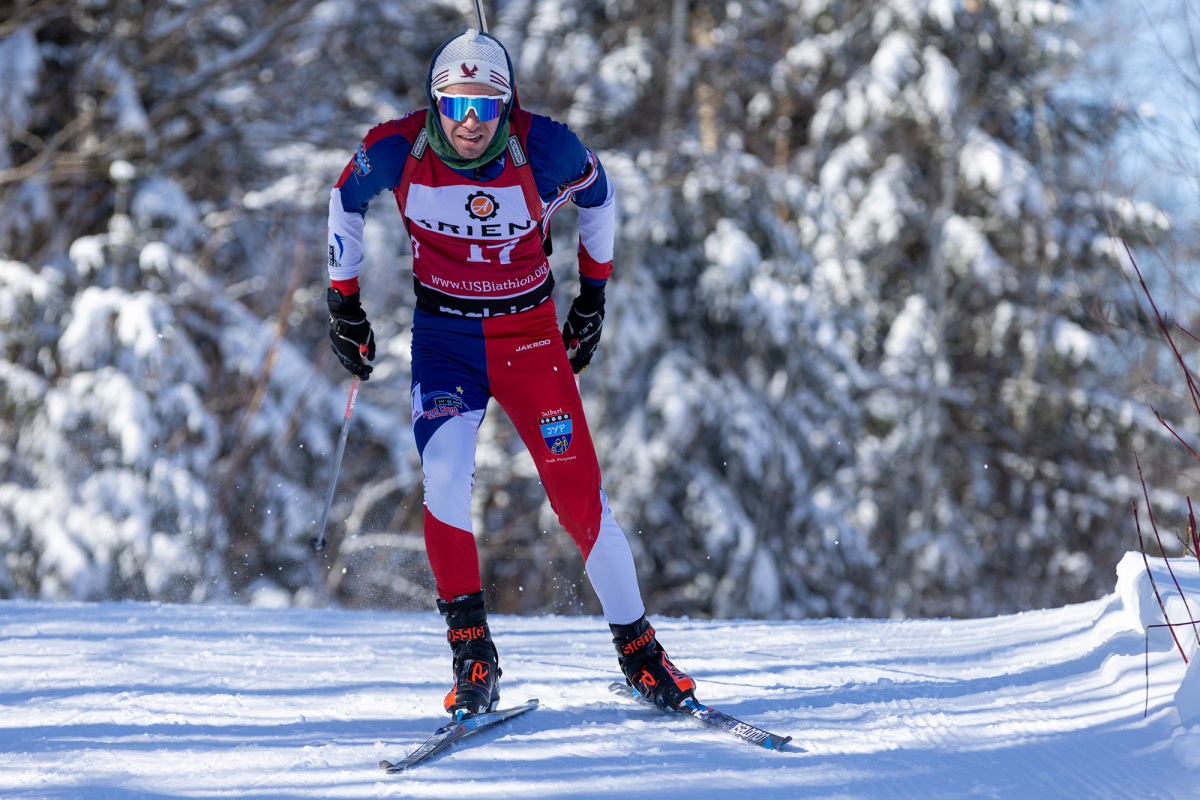
JERICHO, Vt. – If one thing is constant in summer biathlon races here at the Ethan Allen Firing Range, it’s the sight of Lanny and Tracy Barnes near the top of the results sheets. Since 2009, only one of the sisters, Tracy, has been off the podium – and it was just once. Lanny has won the majority of the races.
And the 2012 edition of the North American Rollerski Biathlon Championships was no different. Lanny Barnes won Saturday’s 7.5 k sprint by almost 20 seconds, and then doubled down to take the 10 k pursuit title by over a minute.
Tracy Barnes placed third in the sprint, behind Claude Godbout of Quebec, before moving up in the pursuit to finish second behind her sister.
The key for both of the Durango-based twins was shooting: over two days and a combined total of six shooting stages, or 30 shots, Lanny missed two targets and Tracy three. The other women in the race had at least four penalties in the pursuit alone.
Neither Barnes was available for comment.

Godbout, a native of Valcartier whose only World Cup experience was at the 2011 races in Fort Kent and Presque Isle, Maine, was happy with her podium finish on Saturday, but hesitated to draw conclusions about how she would stack up against the U.S. national team women she beat once the races moved to snow.
“It’s different, seeing that we all have different rollerskis and even if you have the same brand, sometimes the wheels are just used,” Godbout said after the race. “So yeah, you can compare with each other, but it’s never the same from the summer to the winter.”
Nevertheless, she appreciated the chance to race against some more experienced Americans.
“Susan [Dunklee] passed me on the second loop, and you see how she skis, and she’s really fast so you try to stay with her,” Godbout said. “And that’s fun because I’m training with three younger girls in Quebec City, so to be here training with older people who are super strong is always fun.”
Godbout is in the midst of a major increase in volume, as part of her bid to make the Olympic team in 2014; Sochi, she said, is her main focus. As a result, she didn’t feel like she had her top gear with her this weekend. But that wasn’t the point.
“It’s been a while that I’ve been training and always doing the same things,” she explained on Saturday. “So I’m trying this year to change my training a little bit and to do a lot of training, a lot of volume, and see how it goes. If it doesn’t work, then at least you tried and you still have one more year. So we’ll see how it goes. Right now I’m happy with today.”
Dunklee, like many of her national team teammates, was undone by shooting in the sprint: along with Sara Studebaker, Hannah Dreissigacker, and Corinne Malcolm, she shot one penalty in prone and four in standing, for an overall total of fifty percent. But despite five penalties to Tracy Barnes’ two, Dunklee was just nine seconds behind her in fourth place.

“I just didn’t feel very settled,” Dunklee said of her standing stage. “Sometimes if I miss the first two shots I’ll kind of reset, put my head up, look at the targets and start over again, but I’m not really sure why [that didn’t help].”
She did have one idea to explain her poor performance on the range. A fierce competitor, Dunklee had gotten wrapped up in trying to keep up with the men once they started the race a few minutes after the women.
“On that second loop I got excited because they guys had started, and they began passing us and I’d say, ‘I’m going to stick on this one,’” she explained. “So I did these little miniature sprints all over the loop. I didn’t pace myself very well. I just really like trying to ski behind people who are faster, and trying to pick up on their technique… [skiing with the men] when we’re going hard doesn’t happen very often.”
U.S. women’s coach Jonne Kahkonen wasn’t quite sure why his athletes struggled on the range on Saturday, but hypothesized that the first real races of each summer are always much more difficult than training. He also mentioned the heat and humidity, which sapped athletes’ energy this weekend.
“I don’t know what reason, but it always seems like the first tough effort here takes some adjusting,” Kahkonen said. “For us coming from Lake Placid, it’s just a little bit different approach, maybe [the uphill into the range] and the different terrain. So it seems like that plays a role, but they can adapt pretty quickly now. I’m expecting a little bit better for tomorrow.”
He was right: none of the women in the field shot fifty percent or worse in the pursuit, although none attained the Barnes standard of perfection, either.

In part because she is pre-qualified for a training camp in Sweden in November, which these rollerski races serve as trials for, Dunklee skipped Sunday’s pursuit.
“I feel like the last couple years every single race I’ve been in has been a trials race of some sort, and it was so nice to not have to deal with that,” she laughed.
Instead, it was the other pre-qualified athlete, Studebaker, who broke into the top three when Godbout faltered with eight penalties. Studebaker had placed a disappointing seventh in the sprint, and started the pursuit about 80 seconds behind Godbout.
“It’s always nice to move up in a pursuit, and today was no different,” Studebaker wrote in an e-mail this morning. “Going into the last loop Annelies [Cook], Claude, Yolaine [Oddou] and I all left the penalty loop right near each other so I had a good time chasing people down and trying to end on a high note. It was definitely nice having the Quebec biathletes come down and add some depth to our field since we get to race each other all the time.”
Kahkonen said that he had been chatting with Jean Paquet, the Quebec-based Canadian men’s team coach, about how to have more joint race opportunities and even training camps.
“I think it’s always good [to have them],” he said of the Canadian athletes. “I always say that there’s only so many of us, so we should try to get the North Americans together. I hope we can do this more in the future.”




